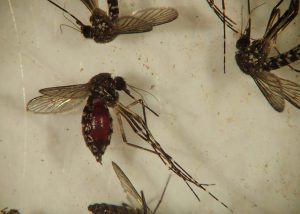- There are 66 Florida mosquito control districts that suppress mosquito species populations by using integrated mosquito control methods.
- A survey of the Sunshine State’s mosquito control districts has shed light on a variety of species that are understudied. This has created a gap of knowledge for devising effective control strategies.
- The survey, conducted by scientists at University of Florida’s Institute of Food and Agricultural Sciences (UF/IFAS), helps illustrate mosquito control priorities among districts and activities across regions. Scientists hope this will foster increased dialogue and alignment among districts and scientists for future research work of understudied mosquitoes.

VERO BEACH, Fla. — Florida’s sunny climate serves as an ideal place for a variety of mosquito species to make their homes throughout the year. While some mosquitoes can be a nuisance by simply biting humans and wildlife, other mosquitoes can spread harmful viruses like dengue, West Nile, Zika and parasites like malaria.
From conducting species outbreak surveillance that track the numbers and types of mosquitoes in an area to developing methods that eliminate larvae and adult mosquitoes, Florida’s 66 mosquito control districts work on a local level. Each district aims to establish mosquito control methods based on the species that are detected as a priority in the immediate area they serve.
In a newly published paper, Mosquito Control Priorities in Florida – Survey Results from Florida Mosquito Control Districts, scientists at the UF/IFAS Florida Medical Entomology Laboratory (UF/IFAS FMEL) shed light on the variety of understudied mosquito species throughout the state that are the focus of Florida’s mosquito control districts. The survey serves as real-time reference of the multitude of species priorities set and control methods conducted in communities across the state. In the battle against the spread of mosquito-borne illnesses, scientists see this as a key takeaway. The survey reveals a knowledge gap and a need for districts to align mosquito-control strategies.
“This survey is a snapshot of the current mosquito control priorities and practices for Florida mosquito control districts that will serve as an important record of reference for comparison of mosquito control priorities and activities across regions,” said Yoosook Lee, an assistant professor of molecular ecology at UF/IFAS FMEL.

The data show each district’s priority species for control, particularly those that are largely understudied compared to well-known disease vectors such as Aedes aegypti.
“We find it likely that other regions, particularly those with a similar ecological setting and diversity of mosquito species throughout Florida, might face similar issues of understudied species as control priorities,” Lee said. “Comparing priorities and approaches between regions may illuminate differences in mosquito control decision-making and yield insight into intervention efficacy, and behavioral, phenotypic or genetic differences of mosquito populations between regions.”
During fall 2020, scientists at UF/IFAS FMEL initiated the survey across Florida’s mosquito control districts to collect baseline data on the current control priorities relating to priority control species, common adult and larval control methods and major research questions that will improve their control and surveillance programs.
The survey data showed that 17 mosquito species were considered priority control targets, with many of these species being understudied. The most common control approaches included truck-mounted ultra-low-volume adulticides and biopesticide-based larvicides.
Among other key survey takeaways:
- Some species like Culiseta melanura is an important vector of Eastern equine encephalitis (EEE). This is a rare-but-deadly disease, with Florida as one of the top three states for EEE cases during the last decade. Due to severity of this rare disease, scientists target this species as deserving more attention by both research and control professional communities.
- More work on basic science questions are needed to devise more effective surveillance and control strategies.
- Findings highlight a need for alignment of research priorities between mosquito control districts and mosquito research.
“We note a need for greater alignment of research priorities between mosquito control and mosquito research needs to prioritize filling knowledge gaps relating to understudied mosquito species that have been implicated in arbovirus transmission,” said Lee. “We hope this is the beginning of the dialog with Florida mosquito control communities and in our interest to building stronger relationship with them to guide vital research and contribute to better public health outcomes for Floridians.”
-30-
By: Lourdes Mederos, rodriguezl@ufl.edu
The mission of the University of Florida Institute of Food and Agricultural Sciences (UF/IFAS) is to develop knowledge relevant to agricultural, human and natural resources and to make that knowledge available to sustain and enhance the quality of human life. With more than a dozen research facilities, 67 county Extension offices, and award-winning students and faculty in the UF College of Agricultural and Life Sciences, UF/IFAS brings science-based solutions to the state’s agricultural and natural resources industries, and all Florida residents.
ifas.ufl.edu | @UF_IFAS
 0
0
